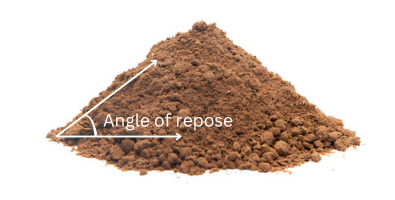Angle of repose
Definition, factors affecting it, and its importance in geotechnical studies
What is the angle of repose?
The angle of repose is the angle at which the material stops sliding and begins to rest in a state of equilibrium. The slope that sand takes naturally when poured on a flat surface is the angle of repose. This property is very important for the safety and stability of slopes, embankments, retaining walls, and other soil-related constructions.

Why is the angle of repose important in geotechnical studies?
1. Slope stability
Slopes that are steeper than the angle of repose are most prone to failure, especially when secondary loads or adverse environmental conditions like precipitation occur. Geotechnical studies conduct such an angle to have slopes that are stable, and thus safe for structure infrastructures.
2. Subgrade reinforcement
Additional stabilization in construction is required for subgrades having lower angles of repose. Geogrid and geocells have emerged as good solutions used to enhance the stability and bearing capacity of soils for safe and durable construction.
3. Structural design
The angle of repose has a big role in designing retaining walls, embankments, and foundation systems. It helps the engineers find the maximum safe angle to avoid catastrophe failures.
Factors affecting the angle of repose
Several intrinsic and extrinsic factors affect the angle of repose. These include:
1. Roughness of the base
The texture of the surface upon which the granular material is placed has a considerable impact on the angle of repose. A coarse base facilitates enhanced interlocking among the particles, thereby augmenting the stability of the material accumulation and resulting in an elevated angle. In contrast, a smooth base diminishes friction, thereby increasing the likelihood of slippage.
2. Density of the soil
Soils with higher density have higher interparticle forces, meaning that their angle of repose increases. Furthermore, moisture content and water retention significantly affect soil density, thus making these aspects crucial.
3. Mean grain size
Larger grains have a greater angle of repose because they interlock better and exhibit less mobility. However, such a relationship very much depends on grain shape and distribution, which also influences the general stability.
4. Grain shape
Angular grains interlock much more effectively as compared to rounded grains while producing an angle of repose. Conversely, rounded grains slide over each other relatively and thus lead to the cause of an angle.
5. Dilatancy
Dilatancy is the expansion in volume of granular material upon being sheared. Particles rearrange themselves to accommodate the applied forces and leave a looser assembly than prior to deformation with a smaller angle of repose. Designing subgrades or soil reinforcement is a particularly sensitive exercise for dilatancy effects.
Applications of angle of repose in geotechnical engineering
1. Design of retaining structures
The angle of repose is one of the parameters used in the calculation of lateral earth pressure exerted by the soil in retaining walls and embankments. This, therefore, ensures proper stability of the walls and prevents failures.
2. Soil stabilization
The angle of repose is one of the parameters used in the calculation of lateral earth pressure exerted by the soil in retaining walls and embankments. This, therefore, ensures proper stability of soil for the walls and prevents failures.
3. Mining and stockpile management
In mining operations, the angle of repose is that angle by which granular materials are stored and transported safely. Stockpiles are designed based on this parameter to prevent accidental collapses.
4. Earthwork and embankments
The angle of repose is used in the construction of embankments. Engineers use this data to design slopes that are stable and cost-effective.
Geogrids and the angle of repose
One of the most effective ways to manage soils with low angles of repose is by using geogrids. These geosynthetic materials enhance soil stability in three critical ways:
- Restricting particle movement: Geogrids prevent lateral displacement of soil particles, improving cohesion and load distribution.
- Promoting skeleton formation: The interlocking mechanism of geogrids strengthens the soil structure, increasing the angle of repose.
- Maintaining porosity: Geogrids help preserve void spaces within the soil mass, ensuring proper drainage and reducing the risk of collapse.
Formula for angle of repose
The angle of repose is typically calculated using the formula: tan(θ)=h/r
Where:
- θ: Angle of repose (in degrees)
- h: Height of the material pile
- r: Radius of the base of the material pile
The tangent function helps determine the steepest stable slope angle by relating the height and base radius of the pile.
The angle of repose is one of the most fundamental properties of geotechnical studies in the design and stability of soil-involving structures. Understanding the factors affecting this angle, such as particle size, shape, and base roughness, allows engineers to design safer and more efficient structures. Furthermore, geosynthetics, such as geogrids and geocells, introduce innovative solutions for stabilizing soils with low angles of repose, ensuring long-term reliability in a wide range of engineering applications. Incorporating the angle of repose into geotechnical assessments both enhances the safety of structures and optimizes construction practices, hence attributing relevance to the parameter in contemporary engineering.
